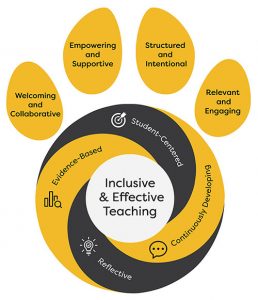General Support & Resources
- The T4LC (Teaching for Learning Center) houses many of the resources you may need regarding teaching support.
- Go to the Canvas Catalog for Asynchronous Introductory Sessions on navigating MU’s review of teaching processes (5 distinct courses): https://umsystem-tlc.catalog.instructure.com/
- After completing the Canvas modules, join fellow colleagues in live conversation about the review of teaching, and engage in practice activities to grow your confidence in applying these processes and tools. Go tohttps://tlcmu.libcal.com/ for Synchronous Sessions (In-person or Zoom)
- Documents from the Task Force to Enhance Learning and Teaching (TFELT), which informed campus policies, can be found here.
- Checklists, rubrics, and workflow recommendations for Peer Review of Teaching can be found in the Canvas Catalog asynchronous modules referenced above: Teaching for Learning Center (instructure.com)
- For faculty teaching online courses or in online programs, you will also want to consider the supports from Missouri Online
- Campus Writing Program offers workshops, retreats, and online teaching resources.
- Office of Service Learning has the goal of providing faculty and staff the support needed to incorporate service-learning in their educational programs.
Teaching with AI
Resources
Missouri Online
- Generative AI Knowledge Base: Generative AI | Missouri Online: Teaching.
- AI documentation: Articles and helpful information are now available on our Teaching Tools website.
- AI survey: Give us insight into how you currently use AI in your class and what resources you expect are needed.
- Blog post: Read our perspective on Teaching in the time of AI on our teaching blog.
Academic Integrity
Here is the link to the “ChatGPT, Artificial Intelligence, and Academic Integrity” page on the Office of Academic Integrity website.
Training Opportunities
Campus Writing Program AI in WI: Teaching Writing with ChatGPT November 8 at 11:00 am – 11:55 am
Student Feedback
MU recently developed a new student feedback on teaching for, which was approved by Faculty Council in December 2022. It will be implemented in Fall 2023 for all MU courses unless other arrangements have been made (for instance, some clinical courses and/or programs that have specific accreditation needs will use different forms). Click here for an FAQ on this new form.
Peer Feedback and Evaluation
There are two kinds of peer evaluation: formative and summative. Faculty should engage with both kinds of peer evaluation and use the T4LC’s robust set of resources and supports regarding both kinds of peer evaluation.
The Provost has asked Deans to encourage departments that do not yet already have a system for performing summative peer reviews to adopt the system for conducting summative peer reviews as laid out by TFELT. Departments that already do this work well should consider adopting relevant parts of the summative peer review process and tool so as to address their needs, but they are also free to continue performing these reviews in the manner that best suits their department.
The Provost recommends that new faculty in years 1 & 2 (and if not on an accelerated schedule) only do formative peer reviews, and that faculty who have completed their last promotion do at least one summative peer review every 5 years.
TFELT Peer Review Form:
TFELT Peer Review Supports:
Canvas Catalog Asynchronous Introductory Sessions (5 distinct courses) to give instructors the foundational knowledge needed for navigating MU’s new recommended review of teaching processes: https://umsystem-tlc.catalog.instructure.com/
After completing the Canvas modules, join fellow colleagues in live conversation about the review of teaching, and engage in practice activities to grow your confidence in applying the new processes and tools. For Synchronous Sessions (In-person or Zoom), go to https://tlcmu.libcal.com/. Search by keywords: Review of Teaching.
Self Reflection
In 21-22 and 22-23, the Provost recommended that all faculty do a teaching self reflection for one course annually. For 23-24, the Provost has moved to adopt the TFELT and Faculty Council recommendation that the self reflection be required for annual reviews.
Over the course of the academic year, units are being asked to incorporate the teaching self reflection as part of their annual review process. A section on “Teaching Self Reflection” appears in the myVita annual self evaluation. Faculty can fill out the self reflection form at any point in the year. (Click here to access a copy of the form for you to consult before filling it out.) It is best to access it though the myVita page on the Provost website. In order to support chairs as they read and respond to these self reflections in the annual reviews of faculty, we have provided guidance in myVita for Chairs.
Inclusive and Effective Teaching
One of TFELT’s recommendations was establishing a definition of and model for “Inclusive and Effective Teaching” for the University of Missouri. The Review of Teaching website contains more information on student feedback, peer review and self-reflection.

Access a text-only description of the model: